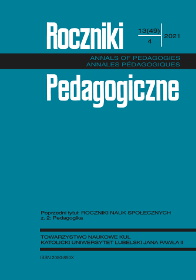Strengthening Resilience in the Family – a Contemporary Need
Main Article Content
Abstract
The phenomenon of resilience is the subject of interest to many scientific disciplines, including pedagogy. The aim of the article was a scientific reflection on the construct of resilience in the context of social change and new needs in (family) upbringing as well as the importance of resilience for person and his family system. The concept of resilience and resilient family is presented, pointing to the etymology of the name, mechanisms of this phenomenon and its relations with the family environment, where the process of developing and strengthening resilience takes place. Arguments were presented that resilience could be an important construct for children and their parents to be more resistant to threats and better prepared to overcome difficulties. And also that they should be prepared for optimal functioning in the world of permanent change and building satisfying interpersonal relationships. The process of supporting resilience can be treated as an area of development of the person and the family. The text ends with pedagogical implications that provide guidelines for building and strengthening family resilience.
Article Details
References
Boczkowska, M. (2020). Resilience rodziny – geneza koncepcji, główne pojęcia, kierunki badań. Niepełnosprawność. Dyskursy pedagogiki specjalnej, 37, 40-55.
Coyle, James P. (2011). Resilient Families Help Make Resilient Children. Journal of Family Strengths; 11,1.
Cyrulnik, B. (2015). Opiekunowie i proces rezyliencji. Studia Poradoznawcze/Journal of Coun- sellogy, 4. 121-130.
Czech-Włodarczyk, C. (2018). Potencjał społeczny i pedagogiczny koncepcji social resilience w erze neoliberalnej. Forum Pedagogiczne, 1, 183-194.
Grant, G., Ramcharan, P., Flynn, M. (2007). Resilience in families with children and adult mem- bers with intellectual disabilities: Tracing elements of a psycho-social model. Journal of Applied Research in Intellectual Disabilities, 20, 563-575.
Junik, W. (2011). Zjawisko rezyliencji – wybrane problemy metodologiczne. W: W. Junik (red.). Resilience. Teoria–Badania–Praktyka (47-55). Warszawa: Wydawnictwo Edukacyjne Parpamedia. Junik, W. (2012). Teoretyczne i empiryczne podstawy wzmacniania rezyliencji (resilience) u dzieci z rodzin z problemem alkoholowym. Dziecko krzywdzone, 3(40), 27-45.
Konaszewski, K. (2020). Pedagogika wrażliwa na resilience. Studium teoretyczno-empiryczne. Kraków: Impuls.
Kulesza, M. (2017). Rodzinne zasoby w pedagogice społecznej i praktyce pedagogicznej. Warszawa: Difin.
Lechowska, B. (2014). Pozytywna psychologia rodziny – w teorii i praktyce. W: I. Janicka, H. Liberska (red.), Psychologia rodziny (537-565). Warszawa: PWN.
Oszwa, U., Domagała-Zyśk, E., Knopik, T. (2017). Zasoby odpornościowe uczniów w środkowym wieku szkolnym a ryzyko niedostosowania społecznego. Ruch Pedagogiczny, 1, 91-103.
Rutkowska, M. (2015). Rezyliencja jako interdyscyplinarna kategoria analityczna i jej zastosowanie w pedagogice. Studia i Badania Naukowe, 9,1, 29-46.
Sikorska, I. (2017). Odporność psychiczna w ujęciu psychologii pozytywnej: edukacja i terapia przez przygodę. Psychoterapia, 2(181), 75-86.
Smulczyk, M. (2016). Resilience a edukacja. Rola fenomenu skutecznej adaptacji w osiągnięciach szkolnych. Forum Oświatowe, 28(2), 203-222.
Walsh, F. (2006). Strengthening family resilience (2nd ed.). New York: Guilford Press.
Walsh, F. (2012). Family Resilience: Strengths Forged Through Adversity. In: F. Walsh (ed.), Normal Family Processes: Growing Diversity and Complexity (4th ed.) (399-427). New York: Guilford Press.
Walsh, F. (2016). Strengthening family resilience (3rd ed.). New York: Guilford Press.

